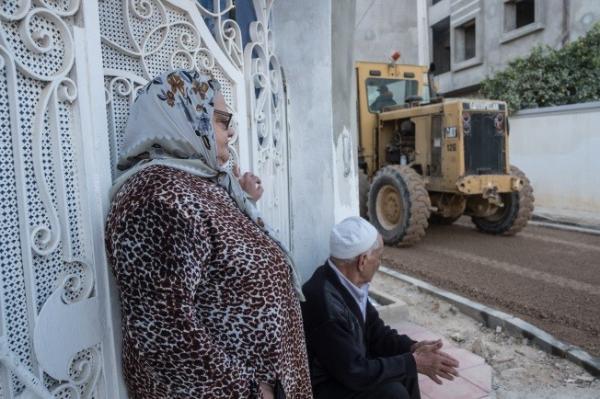
Tunisian Head of Government Youssef Chahed, together with the Minister of Equipment and Minister of Local Affairs, officially launched the second programme for the rehabilitation and integration of working-class districts (PRIQH 2) on Thursday at an event attended by around 100 mayors from across the country. Succeeding PRIQH 1 (in place since 2012), PRIQH 2 will help improve living conditions for 800 000 Tunisians in 146 working-class districts.
A new stage in the long-standing relationship between ARRU and its European partners
The Urban Rehabilitation and Renewal Agency (Agence de réhabilitation et de rénovation urbaine – ARRU), which is responsible for the provision of basic infrastructure and networks in working-class districts, and its European partners have built up a close, uninterrupted relationship renewed via several successive financing agreements benefiting 3 million residents in 1 000 districts across Tunisia. These programmes have increasingly been supported by Agence française de développement (AFD), the European Investment Bank (EIB) and the European Union. The financing provided included loans from AFD and the EIB and EU subsidies.
Taking advantage of this momentum, PRIQH 2 was launched on 4 July at an event attended by senior officials from the Government and beneficiary municipalities.
New infrastructure for working-class districts in Tunisian cities
As with the previous programmes, PRIQH 2 will enable infrastructure construction and renewal in the 146 districts concerned: road paving, water and sewerage connections, electricity network consolidation, public facilities (multi-purpose halls, gyms, etc.), sports fields and industrial buildings.
This programme is receiving EUR 184m of co-financing from AFD (EUR 77m), the EIB (EUR 77m) and the EU (EUR 30m grant). These subsidised resources will make it possible for PRIQH 2 to offer residents (particularly young people) a decent standard of living, with three goals:
- Greater involvement of the elected municipalities in the design and planning of the projects to ensure their adoption and to better prepare them for the management of the new infrastructure and facilities once they have been delivered;
- An expanded role for residents in choosing how the public spaces are laid out and how the facilities are allocated;
- The roll-out of higher quality, more sustainable and more energy-efficient street lighting networks and facilities in order to cut usage costs for municipalities and reduce environmental impact.
French Ambassador to Tunisia Olivier Poivre d’Arvor said: “In line with the undertakings made by President Macron during his State visit in January 2018, France is continuing to support the residents of working-class districts by financing PRIQH 2, thereby aiming to improve day-to-day living conditions and provide access to high quality facilities, particularly for young people.”
EU Ambassador to Tunisia Patrice Bergamini added: “The working-class district rehabilitation programme has become a flagship project for EU cooperation in Tunisia. The project is being led by a public agency whose professionalism is well established and that really changes people's lives. This is why the EU has re-invested three times in this programme since the revolution.”
EIB Representative in Tunisia Ulrich Brunnhuber said: “The EIB is very proud to be financing this large-scale, socially focused project with AFD, the EU and our Tunisian partners. By rehabilitating and renewing these districts, we will improve residents’ daily lives. We are providing low-income districts with basic infrastructure as well as educational and cultural centres for young people. We are also helping to renew historical districts constituting unique cultural and intangible heritage. In doing this, we are supporting a Tunisia that is determinedly looking to the future.”

©EIB
Download original